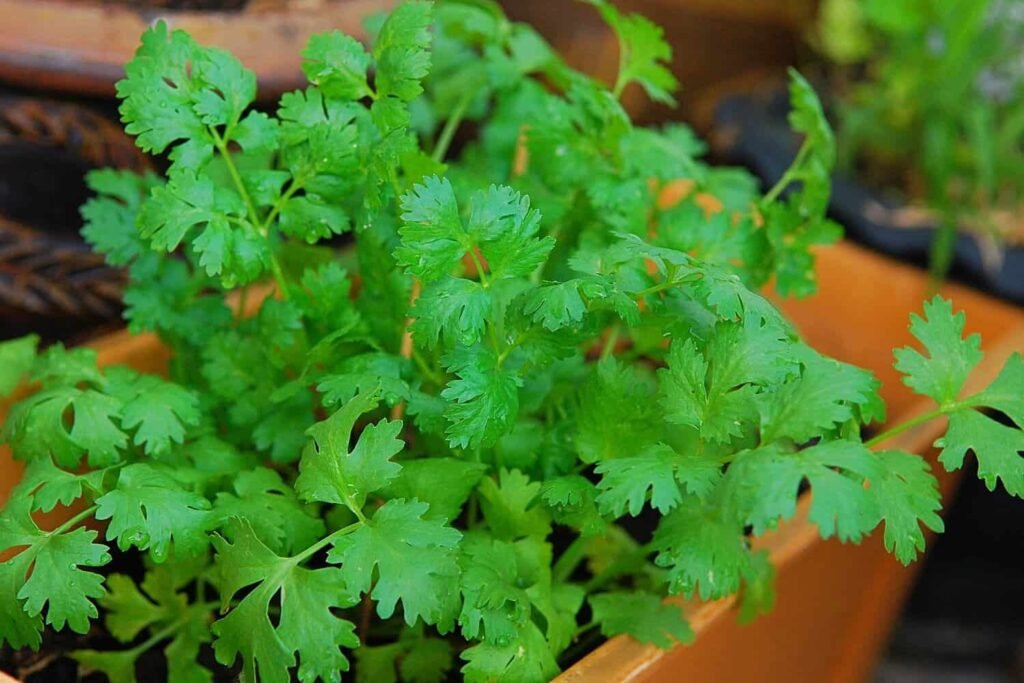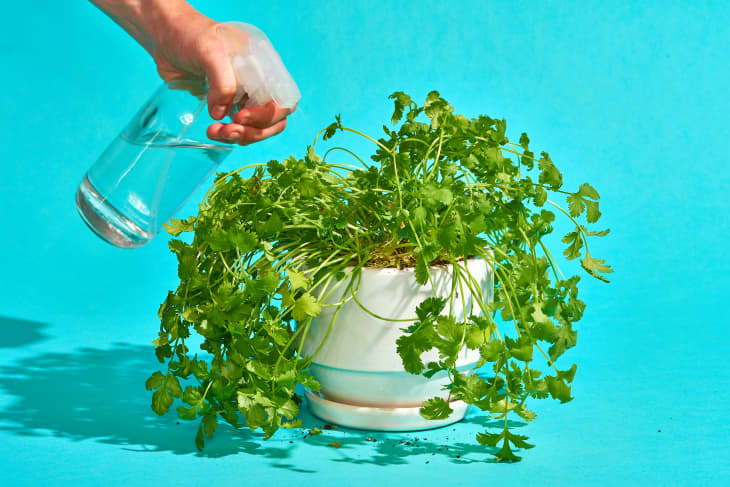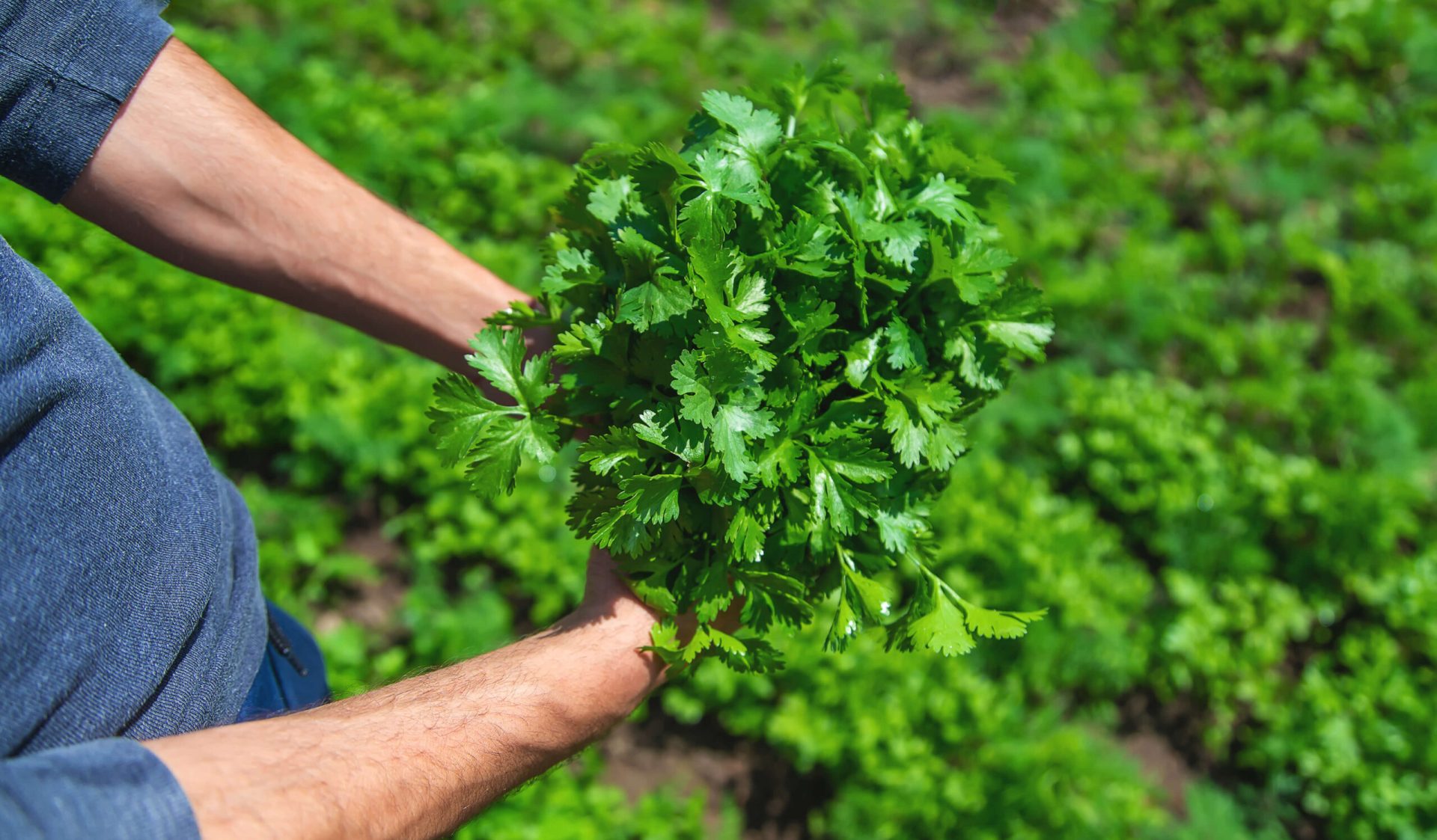
🌿 How to Grow Cilantro in Your Garden
A Beginner-Friendly, Fully Detailed Guide to Planting, Caring For, and Harvesting Fresh Cilantro (Coriander)
If you’ve ever tossed fresh cilantro on a taco or into a bowl of pho and thought, “Wow, that flavor!”—then you already know why this herb deserves a spot in your garden. Cilantro, also known as coriander, is one of the most widely used herbs in global cooking. From salsas and salads to chutneys and curries, its bright, citrusy flavor brings dishes to life.

The best part? Growing cilantro is surprisingly easy—as long as you understand its quirks. This guide covers everything you need to know to grow cilantro from seed in your garden, including how to prevent it from bolting too early, when and how to harvest, and how to keep it producing for longer.
🌱 Why Grow Cilantro at Home?
Fresh cilantro from the grocery store wilts fast and can be pricey for how little you get. When you grow it yourself, you’ll always have fresh leaves on hand—and even the seeds (coriander) for drying.
Here’s why gardeners love it:
- 🌿 Fast-growing: Ready to harvest in just 3–4 weeks.
- 💸 Cost-effective: A single packet of seeds yields multiple harvests.
- 🍲 Dual-purpose: You get cilantro leaves and coriander seeds from one plant.
- 🐝 Pollinator-friendly: If left to flower, cilantro attracts beneficial insects.
- 🌱 Perfect for containers or small spaces.
📅 When to Plant Cilantro
Cilantro loves cooler weather, so timing is crucial.
Best planting times:
- Spring: As soon as the soil can be worked (about 2–3 weeks before your last frost date).
- Fall: 6–8 weeks before the first expected frost for a fall harvest.
🌡️ Ideal temperature: 50°F–75°F (10°C–24°C). Hotter than that? Cilantro bolts fast—meaning it goes to seed and stops producing leaves.
🪴 What You’ll Need to Grow Cilantro
Before you start planting, gather these supplies:
- Cilantro seeds (look for slow-bolting varieties)
- Loose, well-draining garden soil
- Raised bed, garden plot, or pots
- Trowel or garden fork
- Watering can or hose with a gentle spray
- Organic compost or balanced fertilizer
- Shade cloth (optional in warm climates)
🌿 Step-by-Step Guide: How to Grow Cilantro from Seed

1. Choose the Right Location
Cilantro grows best in full sun (6–8 hours daily), but in hotter climates, give it afternoon shade to prevent bolting. Whether you’re using containers, a raised bed, or garden rows, make sure the soil drains well.
2. Prep the Soil
- Cilantro prefers a light, loamy soil with a pH of 6.2–6.8.
- Work in compost or aged manure to enrich the soil.
- Avoid heavy clay or waterlogged areas.
3. Sow the Seeds
- Plant seeds ¼–½ inch deep directly into the soil.
- Space them 1–2 inches apart in rows that are 12 inches apart.
- Thin seedlings to 6 inches apart once they’re a few inches tall.
🌱 Pro tip: Cilantro doesn’t like being transplanted, so it’s best to direct sow it where you want it to grow.
4. Watering
- Keep the soil consistently moist (but not soggy) during germination—usually 7–10 days.
- Water 1–2 times a week depending on rainfall and temperature.
- Use a gentle spray to avoid disturbing shallow roots.
5. Feeding Your Plants
- If your soil is rich, cilantro doesn’t need much feeding.
- Otherwise, apply a balanced organic fertilizer once every 2–3 weeks for steady growth.
- Too much nitrogen can encourage leafy growth but may affect flavor.
☀️ Managing Heat and Preventing Bolting
One of the biggest challenges with cilantro is that it bolts quickly in warm weather—producing flowers and seeds instead of leaves.
Ways to reduce bolting:
- Plant early or late in the season to avoid mid-summer heat.
- Use shade cloth during hot afternoons.
- Choose slow-bolting varieties like ‘Santo’ or ‘Calypso’.
- Succession plant every 2–3 weeks for a constant supply.
Once a plant bolts, the leaves get smaller and lose their flavor—but the flowers attract bees, and the seeds become coriander!
✂️ How to Harvest Cilantro
:max_bytes(150000):strip_icc()/GettyImages-1495592193-0c66ce171d464897b475110807116cd0.jpg)
When to Harvest:
- Cilantro is ready to harvest about 3–4 weeks after planting.
- Harvest leaves when they’re 4–6 inches tall.
- Don’t wait too long—older leaves get bitter.
How to Harvest:
- Use scissors or pinch the outer leaves close to the base.
- Harvest from multiple plants and leave the center to regrow.
- For big batches, cut the whole plant about 1–2 inches above the soil—it may regrow once more before bolting.
Frequent harvesting actually encourages more leaf production.
🌾 Harvesting and Using Coriander Seeds
If you let your cilantro bolt, the plant will form flowers, which turn into seeds. These coriander seeds can be harvested and used in cooking or replanted.
How to harvest coriander seeds:
- Wait until seed heads turn brown and dry out.
- Snip off the entire seed head.
- Place in a paper bag and let them dry further.
- Shake or crush to release the seeds, then store in an airtight jar.
🪴 Growing Cilantro in Pots or Containers

Don’t have garden space? No problem—cilantro grows great in pots!
Container tips:
- Use pots at least 8–10 inches deep.
- Choose a light potting mix with good drainage.
- Water more frequently—containers dry out faster.
- Move containers into light shade in summer to prevent heat stress.
🐛 Common Cilantro Growing Problems
| Issue | Cause | Solution |
|---|---|---|
| Bolting too early | High temps, long daylight hours | Grow in cooler seasons, use shade cloth |
| Leggy seedlings | Not enough light | Ensure 6+ hours of direct sun |
| Yellowing leaves | Overwatering or nutrient deficiency | Water less, apply balanced fertilizer |
| Poor germination | Hard seed coating | Soak seeds overnight before planting |
| Pests (aphids, leafminers) | Common garden bugs | Spray with neem oil or insecticidal soap |
Check plants weekly for pests and water stress, especially in hot or dry weather.
Table of Contents
❓ Frequently Asked Questions
Q: Can I grow cilantro indoors?
Yes, but it can be tricky. Cilantro needs cool temps and strong light—ideally a south-facing window or grow light. Indoor plants tend to bolt quickly if it’s too warm.
Q: How do I stop cilantro from bolting?
You can’t completely stop it—it’s in the plant’s nature. But you can delay it by planting in cooler weather, using slow-bolting varieties, and harvesting frequently.
Q: Can I grow cilantro from grocery store seeds?
Yes—as long as they’re whole, untreated coriander seeds. Split seeds or roasted ones won’t germinate.
Q: How long does cilantro last before bolting?
In cool conditions, you’ll get 4–6 weeks of good leaf harvest. In warmer weather, it may bolt in just 2–3 weeks.
Q: Will cilantro regrow after cutting?
Yes—if you harvest the outer leaves or cut above the crown. It may regrow once or twice before it bolts.
✅ Conclusion: Why Every Garden Needs a Patch of Cilantro
Cilantro is one of those herbs that’s truly worth growing yourself. It’s fast, flavorful, and absolutely loaded with culinary potential—plus, it doesn’t take up much space. Whether you love it in tacos, Thai curry, chimichurri, or chutney, having fresh cilantro on hand elevates your kitchen game instantly.
The key to growing great cilantro is to understand its timing and rhythm—it likes the cool, dislikes the heat, and bolts faster than most herbs. But once you get the hang of succession planting, container care, and quick harvesting, you’ll find it to be a super satisfying addition to your herb garden.
So grab some seeds, loosen that soil, and get ready to enjoy fresh, homegrown cilantro whenever you need it. 🌿
🧾 Quick Cilantro Growing Cheat Sheet
| Task | Details |
|---|---|
| When to Plant | Early spring or fall (cool weather) |
| Germination Time | 7–10 days |
| Planting Depth | ¼–½ inch |
| Ideal Soil pH | 6.2–6.8 |
| Sunlight Needs | Full sun to part shade (in heat) |
| Spacing | Thin to 6 inches apart |
| Watering | 1–2 times a week; keep soil evenly moist |
| Harvest Time | 3–4 weeks (leaves), 6–8 weeks (seeds) |
| Replanting Strategy | Every 2–3 weeks for continuous harvest |
| Container Growing | Pots at least 8 inches deep with drainage |
